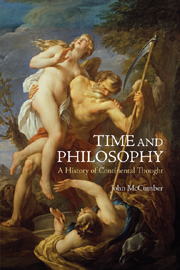Book contents
- Frontmatter
- Contents
- Acknowledgements
- Abbreviations and note on texts
- Introduction
- I Germany, 1790–1890
- II Germany and America, 1900–1968
- III France, 1945–2004
- 10 The future and freedom: Jean-Paul Sartre
- 11 The future and the disclosure of being: Simone de Beauvoir
- 12 The future as rupture: Michel Foucault
- 13 The future and hope: Jacques Derrida
- IV Onwards, 2011–
- Further reading
- Bibliography
- Index
12 - The future as rupture: Michel Foucault
from III - France, 1945–2004
- Frontmatter
- Contents
- Acknowledgements
- Abbreviations and note on texts
- Introduction
- I Germany, 1790–1890
- II Germany and America, 1900–1968
- III France, 1945–2004
- 10 The future and freedom: Jean-Paul Sartre
- 11 The future and the disclosure of being: Simone de Beauvoir
- 12 The future as rupture: Michel Foucault
- 13 The future and hope: Jacques Derrida
- IV Onwards, 2011–
- Further reading
- Bibliography
- Index
Summary
It was early 1956, and the good people of Uppsala, the famous old Swedish university town north of Stockholm, were on their toes. Day and night – and in the winter there was very little day – they had to watch out for a huge beige Jaguar, which was being driven around town by a crazed (and often drunk) instructor at the university. The instructor was a thirty-year-old Frenchman, and his temporary lectureship at the university was the lowest position it contained. His car, like his many convivial meals in the town's best restaurants, had been paid for by his well-to-do family back in France; his father was a doctor in Poitiers. Michel Foucault was not merely drinking and driving, however. He was working hard. In addition to his academic appointment, he was director of the local French cultural mission, the Maison de France. This meant organizing cultural events and sometimes giving impromptu talks at them. The harder he worked at this, the more popular the events became, and the more work there was to do. In addition, he was working on his thesis, which was on the history of science. He had discovered in the university library a fantastic resource: a collection of 21,000 documents, largely devoted to the history of medicine. As he worked through them on winter afternoons, the idea of a new way of doing history began to take shape in his mind.
- Type
- Chapter
- Information
- Time and PhilosophyA History of Continental Thought, pp. 313 - 330Publisher: Acumen PublishingPrint publication year: 2011



